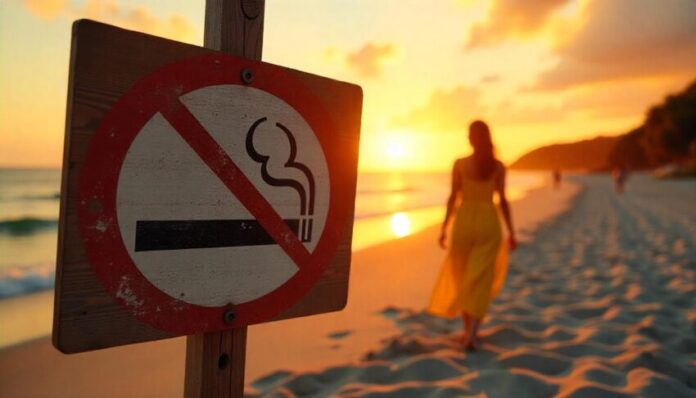A growing movement to protect marine ecosystems and promote responsible tourism has seen 15 countries, including Spain, adopt beach smoking bans. This significant step towards sustainability aims to reduce pollution, protect marine life, and create healthier public spaces for both locals and tourists.
The Growing List of Countries Banning Beach Smoking
Spain is the latest addition to a list of countries taking bold steps towards cleaner travel practices. Other global destinations that have introduced or strengthened beach smoking bans include:
1. Australia: With Queensland’s prohibition on all patrolled beaches, Australia has been leading the charge in smoke-free policies.
2. France: France was one of the first European countries to adopt a beach smoking ban, now extending nationwide.
3. Mexico: Mexico implemented one of the world’s toughest anti-smoking laws in January 2023, banning smoking in all public spaces, including beaches.
4. United States (Hawaii): Since 2015, Hawaii has prohibited smoking on state parks and beaches to preserve its delicate ecosystems.
5. Philippines: The country implemented strict beach smoking bans following major environmental restoration projects on Boracay Island.
6. Italy: While there’s no national ban, many municipalities and regions have tightened local restrictions.
7. Thailand: Thailand enforces a smoking ban on beaches in major tourist areas to protect marine life from cigarette butt pollution.
8. Costa Rica: Costa Rica implemented a nationwide smoking ban in 2012, which includes beaches and other outdoor recreational spaces.
9. Brazil: Smoking bans are more localized but increasing in number, particularly in Rio de Janeiro.
10. Portugal: Portugal aims to create a “smoke-free generation” by expanding public smoking restrictions to outdoor spaces.
Additional Countries Joining the Movement
– Costa Rica: Costa Rica implemented a nationwide smoking ban in 2012, which includes beaches and other outdoor recreational spaces.
– Brazil: Smoking bans are more localized but increasing in number, particularly in Rio de Janeiro.
– Portugal: Portugal aims to create a “smoke-free generation” by expanding public smoking restrictions to outdoor spaces.
Impact on Travelers
The global transition to smoke-free beaches reflects growing awareness of the environmental and health impact of cigarette waste. For travelers, this means researching local regulations before heading to the coast and adopting cleaner travel practices. These bans represent a cultural shift: tourism is now not just about seeing the world but also protecting it.
What Travelers Need to Know
1. Research local regulations before visiting any beach destination.
2. Familiarize yourself with specific beaches that have been designated smoke-free.
3. Understand the fines and penalties for violating smoking bans in each country.
4. Participate in a cleaner, healthier way of traveling by adopting these new rules.
By joining this global movement, travelers can contribute to protecting marine ecosystems, reducing pollution, and promoting responsible tourism practices.
Source: Travel World




